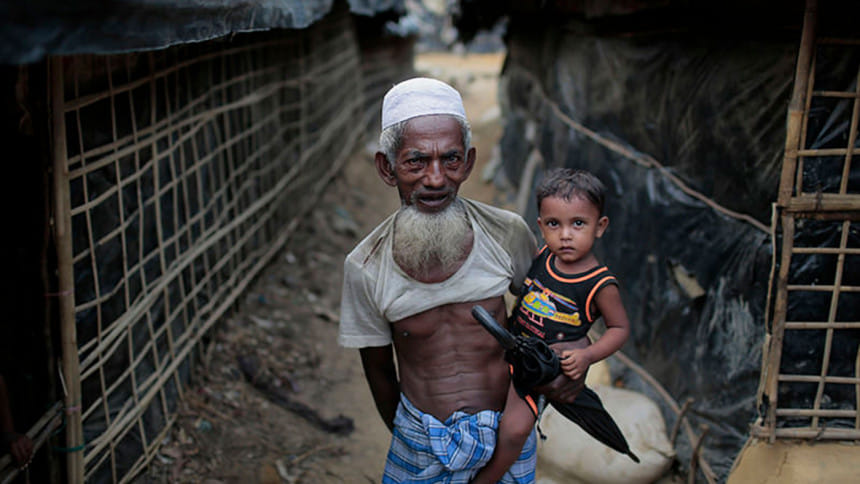Will vaccine nationalism lead to the exclusion of Rohingya refugees?

The World Health Organization (WHO) has adopted "leaving no one behind" and "equitable access to vaccines" as the basic principles for Covid-19 vaccination around the world. GAVI, the Vaccine Alliance, has also set up "equitable and sustainable use of vaccines" and "leaving no one behind" as the core of their high-level strategy for worldwide immunisation. All these strategies are in alignment with the Sustainable Development Goals. However, global vaccination is not just a mere strategy or goal. This relates to the right to healthcare, which is an integral part of the right to life and must be ensured irrespective of nationality, religion, race, creed or culture.
According to a report by the United Nations High Commissioner for Refugees (UNHCR), around 79.5 million people had been forced worldwide from their homes due to persecution, conflict and human rights violations as of mid-2020. That number includes 29.6 million refugees, 4.2 million asylum seekers and 45.7 million Internally Displaced Persons (IDPs). Around 34 million of this 79.5 million are children. Unfortunately, it is not clear who will ensure the Covid-19 vaccination of all these people. According to UNHCR in January 2021, "around 90 countries are currently developing national Covid-19 vaccination strategies and 51—or 57 per cent—have included refugees in their vaccination plans". This trend reminds us that most of the UN member states are ignoring, if not denying, the responsibility to "respect", "protect" and "promote" human rights principles as per the UN Charter towards refugees, IDPs and stateless people.
According to Human Rights Watch (HRW), "vaccine nationalism" has stood as a massive blow to the global vision for universal and equitable access to an affordable vaccine. Vaccine nationalism is when countries prioritise inoculating their own populations before others. Experts have already warned that this vaccine nationalism would prolong the Covid-19 pandemic by years. From the point of view of public health discourse, it is impossible to break or sustainably slow the transmission of the coronavirus unless a minimum of 70 percent of the population has acquired immunity. That is why the UNHCR believes that the exclusion of refugees, IDPs and stateless people from vaccination plans carries the risk of ongoing transmission in these populations, with spillovers into the global population. HRW also thinks that opaque vaccine deals could undermine a global recovery from the pandemic.
It is to be mentioned that refugees, IDPs and stateless people are more vulnerable to the Covid-19 pandemic than others. According to UNHCR, more than 85 percent of refugees are hosted in low- and middle-income countries, where health systems have often been overwhelmed, with limited capacity to manage persons with severe Covid-19 complications. UNHCR also stated that refugees, forcibly displaced and the stateless are often unable to practice social distancing due to overcrowded living arrangements, and with inadequate access to information and health care services, they remain at a high risk of contracting the virus.
There are currently around 866,457 officially registered Rohingya refugees in Bangladesh (although the Bangladesh government terms them as FDMN or Forcibly Displaced Myanmar Nationals), living in just 26 square kilometres of land in Cox's Bazar, with poor access to clean water and other hygiene facilities. Other estimates suggest there are close to 1.1 million Rohingya refugees in Bangladesh. According to the Rohingya Crisis Situation Report 29 by WHO from October 2020, the total number of confirmed Covid-19 patients amongst Rohingya refugees were 310. The report also suggested that nine refugees had died from Covid-19.
While it is good news that the transmission of coronavirus in the refugee camps has been kept under control, we must also remember that it is almost impossible to maintain physical distance in such an extremely overcrowded place like the Rohingya refugee camps. According to HRW, the internet shutdown and mobile phone restrictions in the camps have hindered humanitarian aid groups' ability to provide emergency health services and rapidly coordinate essential preventive measures for the Covid-19 pandemic. We should not forget that as Myanmar does not recognise Rohingyas as its citizen, it has left them as stateless people and turned them into one of the most vulnerable populations in the world. The Rohingya face persistent public health risks, which are likely to be exacerbated by a pandemic. So far, there is no hope that Rohingya refugees would get Covid-19 vaccines from the Myanmar government. There are also no effective international efforts yet to pressurise Myanmar regarding vaccination of the Rohingyas. Nor we have seen any specific commitment from the international community regarding vaccination of the Rohingyas, although global immunisation should be the shared responsibility of all countries.
Bangladesh also has a responsibility towards Rohingya refugees because it has pledged to respect international law and the principles enunciated in the UN Charter, according to Article 25 of its Constitution. The Ministry of Health and Family Welfare had outlined the Bangladesh Preparedness and Response Plan for Covid-19 in July 2020. Although this national strategy recognised Rohingya refugees as a vulnerable population at increased risk of the rapid spread of Covid-19, Bangladesh is yet to declare a probable vaccination strategy and allocation for Rohingyas. According to a report in this daily, the COVAX programme led by the WHO and GAVI is supposed to give Bangladesh vaccines for 34 million people within 2021. However, it is not clear whether the GAVI would request the Bangladesh government to include Rohingyas in this vaccination programme or not.
The Covid-19 pandemic is a public health emergency which requires emergency medical supplies, including emergency access to vaccine. In the case of Syed Saifuddin Kamal and BLAST vs Bangladesh and others [Emergency Medical Services Case], the High Court Division of the Supreme Court of Bangladesh opined that failure to provide emergency medical services is a serious violation of the fundamental rights guaranteed under Articles 27 (equality before law), Article 31 (protection of law) and Article 32 (right to life, liberty and security) of the Constitution. These constitutional safeguards should also be extended to Rohingya refugees by interpreting the "spirit of the law". Thus, vaccine nationalism must not prevail over equality, human dignity and social justice, which are the founding principles of Bangladesh.
Md Saimum Reza Talukder teaches Cyber Law at BRAC University.

 For all latest news, follow The Daily Star's Google News channel.
For all latest news, follow The Daily Star's Google News channel. 



Comments